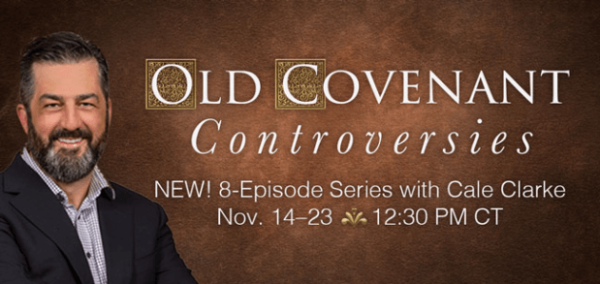Cale Clarke continued his discussion of violence in the Bible in his latest series, Old Covenant Controversies, on The Faith Explained by explaining the 5 phases of God’s divine warfare on the forces of evil.
As discussed in last week’s show, skeptics of Christianity will often bring up the difference between the way God is portrayed in the Old Testament and the way He is portrayed in the New Testament. They see the different ways of writing as evidence that the two cannot be in conjunction with one another. They see the God of the Old Testament as violent and vengeful. How do we reconcile that with the peaceful, loving person of Jesus Christ?
“We begin by considering a biblical theology of divine violence from the Old Testament into the New Testament,” said Cale. “We will see that, far from being in contrast to each other, the two Testaments present one coherent picture of God’s warfare against evil. This biblical theology may be presented in five phases.”
Phase 1: God fights the Sin of the Flesh and Blood Enemies of Israel
This phase is what skeptics typically bring up first when attempting to reject the truth of the Old Testament. It is the documentation of all of the wars that the Israelites waged on their enemies in the Old Testament while favored by God. It includes events like the defeat of the Egyptians, the defeat of Jericho, David’s battles against the Philistines, etc. As long as God’s people follow His will, they will see marvelous victory and their enemies will see crushing defeat.
“When God has directed his people to go into battle, he accompanies them and fights on their behalf. His presence is often symbolized by the presence of the ark of the covenant, which is carried by the priests into battle.”
In this phase, we see that victories are not won only by the size of an army or the tactics of a general. They are won through the power of God. When God fights on your side, there is no doubt about the outcome.
Phase 2: God Fights against the Sin of Israel
God does not fight against nations, against peoples, or against groups. God fights against sin, and we can see that in multiple instances. One example took place at the end of the Battle of Jericho where the Israelites crushed the Canaanites because they had God on their side, Joshua sends some soldiers to a nearby town called Ai. There, the Israelites are massacred. Joshua is confused about why God would allow this to happen, but the Lord informs him that one of his men has sinned. Achan, an Israelite has stolen some of the plunder from the battle and has thus sinned.
Without a doubt, the Israelites are God’s Chosen People, but that does not mean He turns a blind eye to their sins. The consequences are just, whether they be rewards or punishments.
Phase 3: God will Return to Defeat the Oppressors of Israel
God has done it before. He has freed them from the Egyptians, and He has led them in battle against the Philistines and Canaanites. But beyond, God will come again to free them from the bondage of the Babylonians, the Persians, the Greeks, and the Romans, just as was predicted in Chapter 7 of the Book of Daniel. In the second half of Daniel’s vision, we see how a divine warrior comes and delivers his people from the lion, the bear, the leopard, and the unnamed beast.
Phase 4: Jesus Fights Spiritual Powers and Authorities
John the Baptist, Jesus’s cousin, preached of that divine warrior who would come to free the people from the oppression that they were experiencing. It was during Jesus’s life that they were experiencing such suffering, longing for their freedom. At the Baptism of the Jordan, they received very good evidence that Jesus is the one they had been waiting for.
“After Jesus was baptized, he came up from the water and behold, the heavens were opened [for him], and he saw the Spirit of God descending like a dove [and] coming upon him.
And a voice came from the heavens, saying, “This is my beloved Son, with whom I am well pleased.” (Matthew 3:16-17)
“But after John was arrested, he sent word to Jesus, asking if He was the one. Jesus replies, ‘Go back and report to John what you hear and see: The blind receive sight, the lame walk, those who have leprosy are cleansed, the deaf hear, the dead are raised, and good news is proclaimed to the poor’ (11:4–5). What is Jesus saying to John? His later actions indicate that he is in essence saying, “John, I am the divine warrior. But I have heightened and intensified the war so that it is now directed not toward flesh and blood but toward the spiritual powers and authorities. This enemy will be defeated not by killing but by dying.’”
Phase 5: Jesus Wins the Final Battle
John doubted Jesus’s identity and public ministry because he “simply spoke better than he knew.” The prophecy of Christ’s coming would be fulfilled in two stages. The first stage is His earthly life where He leads people by giving them the truth, peace, love, and healing. Then, after He is put to death, He will resurrect and ascend into Heaven. And at an hour no man knows, He will return with a violent judgment – the one John predicted – against evil people and evil powers.
Listen to this full episode of Old Covenant Controversies above or on The Faith Explained show page! And be sure to catch the rest of the episodes live on Relevant Radio at 12:30pm CT from November 14 – November 23!



